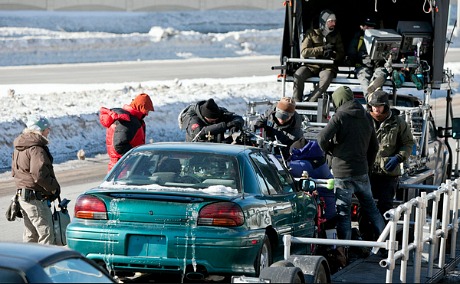This morning Rope of Silicon‘s Brad Brevet posted a list of nine films he believes are the most likely to emerge as 2015 Best Picture Oscar nominees. So I decided to post a list of my own. The only Brevet nommies I disagree on are Pete Docter‘s Inside Out, which will not be Best Picture nominated because it’s animated and that’s that, and Steven Spielberg’s Bridge of Spies, which I suspect will probably turn out to be a bit stodgy and time-piecey and maybe self-enshrining (you know Spielberg). In place of these two I’m betting the Academy will want to nominate one of the five big social-political films (James Vanderbilt‘s Truth, Jay Roach‘s Trumbo, Thomas McCarthy‘s Spotlight, Oliver Stone‘s Snowden, David Gordon Green‘s Our Brand Is Crisis) and perhaps even two of these….who knows?
I’m also betting/hoping that if Universal decides to platform Joel and Ethan Coen‘s Hail Caesar! in December it might well make the cut as the script happens to be brilliant and hilarious, even though it’s one of the Coen’s goofball flicks. It also goes without saying that while general assumptions seem to be that Martin Scorsese‘s Silence will probably open in 2016, the historical drama will almost certainly be a 2015 Best Picture nominee if it opens later this year (unless it turns out to be too gruesome). I realize that Love & Mercy‘s best shot is with the Spirit Awards but I’d love to see it Oscar-nominated — I think it really deserves to be.
Rope of Silicon’s 7.1 predictions (in this order of likelihood):
1. Steve Jobs (Universal, 10.9) — Danny Boyle (director), Aaron Sorkin (screenplay), Scott Rudin (producer); Cast: Michael Fassbender, Seth Rogen, Michael Stuhlbarg, Kate Winslet, Katherine Waterston.
2. The Revenant (20th Century Fox, 12.25) — Alejandro González Inarritu (director/screenplay); Mark “nobody can remember my middle initial” Smith (screenplay); Leonardo DiCaprio, Tom Hardy, Will Poulter, Domhnall Gleeson.
3. The Danish Girl — (Focus Features, 11.27) — Tom Hooper (director). Eddie Redmayne, Alicia Vikander, Amber Heard, Matthias Schoenaerts.
4. Carol (Weinstein Co., 12.18) — Todd Haynes (director); Pyllis Nagy (screenplay, based on Patricia Highsmith novel); Cate Blanchett, Rooney Mara, Sarah Paulson, Kyle Chandler. Cannes reaction: Best Picture, Best Actress/Supporting Actress, Best Screenplay (Phyllis Nagy).
5. Joy (20th Century Fox, 12.25) — David O. Russell (director/screenplay). Cast: Jennifer Lawrence, Robert De Niro, Bradley Cooper, Édgar Ramirez.
6. Bridge of Spies (Disney, 10.16) — Steven Spielberg (director); Matt Charman, Ethan Coen, Joel Coen (screenplay); Tom Hanks, Mark Rylance, Amy Ryan, Alan Alda, Billy Magnussen, Eve Hewson.
7. The Walk (TriStar/ImageMovers, 9.30) — Robert Zemeckis (director/screenplay); Christopher Browne (screenplay); Joseph Gordon-Levitt, Ben Kingsley, James Badge Dale, Charlotte Le Bon. Sony/TriStar, 10.2.
8. Inside Out (Disney/Pixar, 6.19), d: Pete Docter.
9. Brooklyn (Fox Searchlight, 11.6) — John Crowley (director), Nick Hornby (screenwriter) — Saoirse Ronan, Domhnall Gleeson, Emory Cohen, Jim Broadbent, Julie Walters.
Read more



